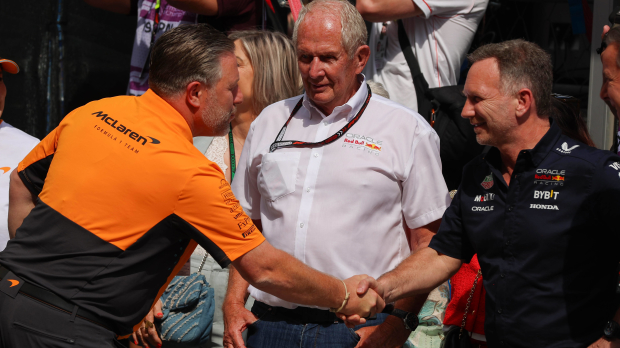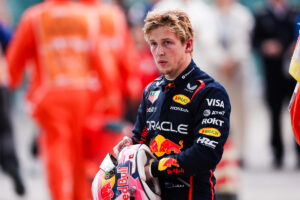Red Bull DESPERATION made clear by aggressive new Horner strategy…….

Red Bull DESPERATION made clear by aggressive new Horner strategy
Red Bull’s struggles in the 2024 Formula 1 season have become a focal point of attention, as the once-dominant team faces a dramatic downturn in form. After going eight races without a victory, the team’s commanding lead in both the drivers’ and constructors’ championships has been eroded by rivals, particularly McLaren. With Max Verstappen now managing to finish ahead of McLaren’s Lando Norris in only one of the last six Grands Prix, the Milton Keynes-based outfit has found itself in an unfamiliar position: fighting simply to limit the damage in a championship battle they once controlled with ease.

McLaren has now overtaken Red Bull in the constructors’ standings, with Norris leading the charge. Red Bull, who began the season as one of the fastest teams on the grid, now seems to be a step behind, arguably only the fourth-best team for several months. Meanwhile, Verstappen has struggled to maintain his early season dominance, despite being a three-time world champion. The team’s decline has been largely attributed to a faulty development path for the RB20 car, with particular issues identified in the car’s floor design. These problems have forced Red Bull to revert to older versions of their car, highlighting a significant weakness that has not been addressed adequately over the course of the season.
With technical solutions proving elusive, Red Bull has shifted its approach to a more aggressive strategy, led by team principal Christian Horner. Known for his sharp tongue and combative nature, Horner has started to focus less on his team’s internal challenges and more on stirring up trouble for rival teams. In particular, Horner has targeted McLaren, aiming to sow discord within the team by suggesting that their clear driver hierarchy—favoring Norris over Oscar Piastri—has been a source of internal friction.

“Lando Norris, they’re paying five times what they pay Oscar, so I would assume he would be their No. 1 driver, or their biggest asset,” Horner said in recent comments. He went on to suggest that Piastri’s strong performances were causing McLaren headaches, adding, “When the second driver starts outperforming the first driver, that’s when you tend to have a headache.”
However, Horner’s comments seem somewhat off-base. Despite Piastri’s impressive results, McLaren’s failure to prioritize Norris early in the season is one of the reasons why Verstappen still holds a 52-point lead in the drivers’ championship. Nonetheless, Horner’s objective may not be to offer insightful analysis, but rather to create tension within McLaren’s ranks and disrupt the harmony between its two drivers.
Horner’s disruptive strategy has not been limited to McLaren. In Singapore, he made waves by hinting at Red Bull’s interest in Mercedes driver George Russell, whose contract is set to expire at the end of next season. “Russell is out of contract at the end of next year – it would be foolish not to take that into consideration,” Horner remarked. Mercedes team principal Toto Wolff quickly dismissed the comments, accusing Horner of “trying to stir s*** up.”
While there may be little substance to Horner’s public musings about signing Russell, the strategy is clear: create uncertainty among rivals to weaken their internal negotiations and team dynamics. In the case of Russell, even raising the possibility of Red Bull’s interest could complicate his contract talks with Mercedes, giving Red Bull a minor edge in destabilizing one of their competitors.
This shift to psychological warfare highlights Red Bull’s diminishing confidence in their ability to reverse their fortunes through on-track performance alone. With McLaren now holding the momentum, and Ferrari and Mercedes also making strides, Red Bull’s chances of regaining their early-season dominance seem increasingly remote. For now, Horner appears to be banking on creating distractions and tensions in rival teams, hoping that such disruptions will slow their progress.
While Red Bull may be employing an aggressive, somewhat desperate approach, this kind of off-track gamesmanship is nothing new in elite sports. Similar tactics can be seen in football press conferences, where managers attempt to unnerve opponents, or in tennis, where coaches might point out a rival player’s weaknesses mid-match. Championships are often won through speed, technical excellence, and solid strategy—but history has shown that mind games have played their part in Formula 1’s most memorable moments. Horner and Red Bull are hoping that it can do so again.





